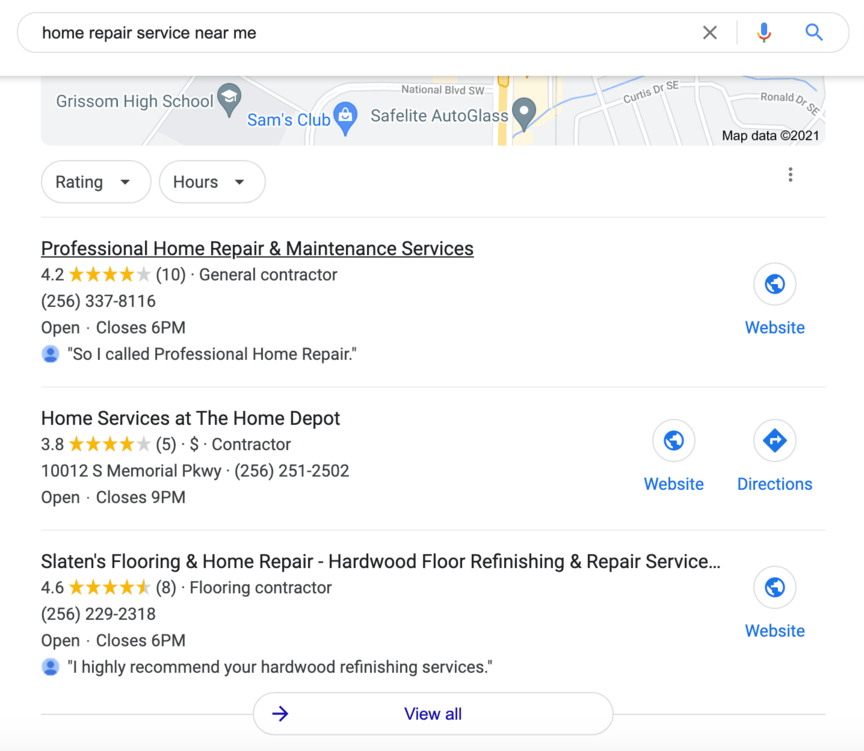-
 8 min. read
8 min. read
-
 Matthew Gibbons
Matthew Gibbons Lead Data & Tech Writer
Lead Data & Tech Writer
- Matthew is a marketing expert focusing on the SEO & martech spaces. He has written over 500 marketing guides and video scripts for the WebFX YouTube channel. When he’s not striving to put out some fresh blog posts and articles, he’s usually fueling his Tolkien obsession or working on miscellaneous creative projects.
You probably already know that digital marketing is essential for your business. Without it, people wouldn’t discover your business and learn about your brand. Digital marketing enables you to reach large audiences of online users and convince them to buy your products or use your services. But small business online advertising incorporates many strategies and tactics, and it can be difficult to know where to start. If you’re looking for some direction for your Internet marketing, you’re in luck!
Below, we’ve outlined a list of digital marketing tips for small businesses, which you can follow to kick your campaigns into gear and start driving revenue. Read on for our top-tier online marketing tips, and then subscribe to Revenue Weekly — our email newsletter — to receive more marketing tips and tricks from the agency with over 1,100 client testimonials!
11 effective online marketing tips for your business
One of the best things about digital marketing is that it includes many options and formats. You can harness everything from visual design to search terms to reach your ideal audience. Below, we’ve compiled 11 of the best tactics to use in your marketing campaigns. Here are 11 digital marketing tips for small businesses to get you started!
1. Brand yourself
One of the most critical things you should do in any digital marketing strategy is brand yourself. That is, you should ensure that every campaign you run shows off your company’s unique brand style. There are various ways to express your brand. Font styles, color schemes, word choices, and more can all contribute to how people perceive your brand. Is your brand elite and elegant?
Laid-back and personable? Humorous and silly? Whatever it is, make sure your marketing conveys that. The reason branding yourself is so important is that it helps people remember you.
A given user might visit multiple websites in one day, and you want yours to stand out from the crowd.
2. Define your target audience
Before you get started with digital marketing for small businesses, you need to know who you’re targeting with your marketing. Your campaigns won’t drive success if you don’t know who’s meant to see them.
To establish your target audience, look at a typical customer that buys from your business. Define characteristics like:
- Age
- Gender
- Occupation
- Income
- Location
- Buying/Spending habits
- Hobbies
- Interests
You can use this information to form buyer personas, which are fictional representations of your customers. These buyer personas help you target new leads for your small business.
3. Use Google Business Profile
Google Business Profile is a Google feature that can be a massive benefit to your local marketing. With Google My Business, you can create a profile for your business that includes information like your name, address, and phone number. When you set up a Google Business Profile, Google can display it in local search results. If someone searches for “[your industry] near me,” Google will often display a local 3-pack of relevant Google Business Profiles.  You may already have a Google Business Profile account automatically created for your business, in which case you can claim it by verifying ownership of your company.
You may already have a Google Business Profile account automatically created for your business, in which case you can claim it by verifying ownership of your company.
4. Optimize your presence in search results
Another critical strategy to add to your small business digital marketing plan is search engine optimization (SEO). SEO is an essential strategy to help your business rank in search results — it involves optimizing your website to appear in relevant results.

To help your site rank in search results, follow these best practices:
- Conduct keyword research to find relevant terms for your business
- Focus on long-tail keywords to help drive qualified traffic to your site
- Create content to continually drive traffic to your site (we’ll discuss this more later)
- Improve page speed to rank higher in search results
- Create a mobile-friendly site to ensure visitors have a positive experience
By optimizing your website for search results, you’ll help more people discover your small business and get them to visit your business.
5. Start a blog
One of the best methods for propelling your small business marketing is to start a blog on your website. On your blog, you can write posts centered around various topics in your industry, educating users on things they might be interested in knowing. For example, if you run a pest control business, you could write blog posts on common types of pests to watch out for and how to prevent them from entering your home. Or, if you manage an electronics store, you could write about how people can protect their devices. The benefit of having a blog is that your posts can rank for relevant searches in Google, meaning people will be drawn to your website in search of answers to their queries.
6. Launch paid search campaigns in Google Ads
Another way to reach your audience through Google is with paid search ads. Paid search ads appear at the top of Google search results and look similar to organic results except for the “Ad” label in the top corner.  You can launch a paid advertising campaign in Google Ads — a must-have small business marketing tool — where you can bid on specific keywords you want to target. You can also focus your ads on specific groups of users based on demographics like age and location to make them as relevant as possible. Your ads can lead people to landing pages on your site where they can convert.
You can launch a paid advertising campaign in Google Ads — a must-have small business marketing tool — where you can bid on specific keywords you want to target. You can also focus your ads on specific groups of users based on demographics like age and location to make them as relevant as possible. Your ads can lead people to landing pages on your site where they can convert.
Even when people don’t convert right away, paid ads are fantastic for spreading brand awareness!
BONUS READ: How to Advertise Your Business Online
7. Build some email remarketing lists
One of the best strategies is remarketing, a type of marketing directed exclusively at people who have already visited your website and expressed interest in your company. It’s an incredibly effective technique, and one of the best ways to do remarketing is to build an email list. You can build an email list by using short forms on your website to encourage users to sign up for your emails. You can draw them in with a specific offer, like a newsletter or special discounts.
Once people sign up, you send them whatever material you initially offered them. Since your subscribers signed up voluntarily, they’ll be happy to receive your emails, allowing you to consistently send branded emails to them and remind them of what drew them to you in the first place.
8. Make your site mobile-friendly
Did you know that 83% of users expect pages they visit to load in three seconds or less? If your page takes longer than that to load, most people will end up hitting the “back” button instead of sticking around. To keep that from happening, you need to optimize your page speeds. You can help your pages load faster by doing the following:
- Caching web pages
- Limiting redirects
- Minifying code
- Compressing images
With fast-loading pages, you’ll be able to retain more traffic and drive more conversions!
9. Create a social media account
If your business doesn’t yet have a social media account, consider making one. The average user spends 28% of their Internet time on social networks, making social platforms the optimal place to advertise your company. You can start by simply creating an account and posting engaging content like infographics and videos. As people are drawn to the content, many of them will progress to your site and end up converting. You can also run paid social media ads that appear right in users’ social media feeds, further expanding the reach of your small business marketing.
10. Produce video content
The last of our online marketing tips is to try using video in your marketing content. Videos are excellent for catching your audience’s attention and engaging them. There are various contexts in which you can use video content. You can include videos on your website, post them on social media, or even launch your own YouTube channel. As for the content of your videos, you can use them for a variety of purposes — tutorials, employee introductions, and outright ads are all viable options.
11. Track your campaigns to see where you can improve
The last strategy we’ll cover on our list of marketing tips for small businesses is to track your campaigns. When you launch your digital marketing strategies, regardless of which ones you use, you want to ensure they’re driving your desired results.
By tracking your campaigns, you get insight into whether your campaigns are working effectively to help your business grow online.
The types of metrics you track will depend upon your strategy and campaign, but here are some general metrics companies track:
- Organic traffic
- Impressions
- Clicks
- Clickthrough rate (CTR)
- Dwell time
- Leads
- Conversions
WebFX has driven the following results for clients: $6 billion 24 million 7.14 millionOur digital marketing campaigns impact the metrics that improve your bottom line.
See More Results 
![]()
In client revenue
![]()
Leads for our clients
![]()
Client phone calls
WebFX can help you optimize your digital marketing strategy
Need a hand getting your small business marketing off the ground? WebFX would love to help! With over 28 years of marketing experience, our SMB digital marketing agency has all the skills and dedication needed to optimize your digital marketing strategy. With our digital marketing services, you can get help optimizing your campaigns for all the tactics listed above.
You’ll also receive a dedicated account representative to keep you in the know about all that we do for you. To get started with us, just give us a call at 888-601-5359 or contact us online today!
-
 Matthew is a marketing expert focusing on the SEO & martech spaces. He has written over 500 marketing guides and video scripts for the WebFX YouTube channel. When he’s not striving to put out some fresh blog posts and articles, he’s usually fueling his Tolkien obsession or working on miscellaneous creative projects.
Matthew is a marketing expert focusing on the SEO & martech spaces. He has written over 500 marketing guides and video scripts for the WebFX YouTube channel. When he’s not striving to put out some fresh blog posts and articles, he’s usually fueling his Tolkien obsession or working on miscellaneous creative projects. -

WebFX is a full-service marketing agency with 1,100+ client reviews and a 4.9-star rating on Clutch! Find out how our expert team and revenue-accelerating tech can drive results for you! Learn more
Try our free Marketing Calculator
Craft a tailored online marketing strategy! Utilize our free Internet marketing calculator for a custom plan based on your location, reach, timeframe, and budget.
Plan Your Marketing Budget
Table of Contents
- 11 Effective Online Marketing Tips for Your Business
- 1. Brand Yourself
- 2. Define Your Target Audience
- 3. Use Google Business Profile
- 4. Optimize Your Presence in Search Results
- 5. Start a Blog
- 6. Launch Paid Search Campaigns in Google Ads
- 7. Build Some Email Remarketing Lists
- 8. Make Your Site Mobile-friendly
- 9. Create a Social Media Account
- 10. Produce Video Content
- 11. Track Your Campaigns to See Where You Can Improve
- WebFX Can Help You Optimize Your Digital Marketing Strategy

Maximize Your Marketing ROI
Claim your free eBook packed with proven strategies to boost your marketing efforts.
Get the GuideTry our free Marketing Calculator
Craft a tailored online marketing strategy! Utilize our free Internet marketing calculator for a custom plan based on your location, reach, timeframe, and budget.
Plan Your Marketing Budget





